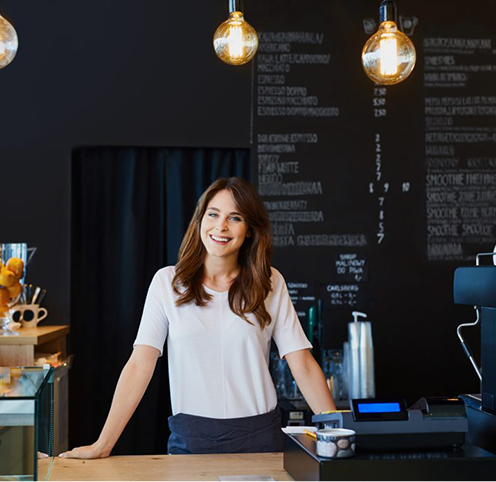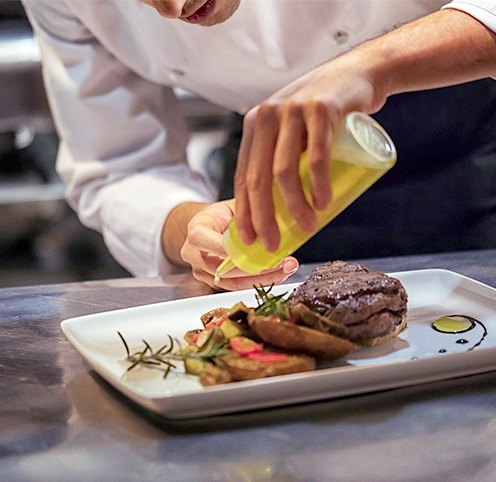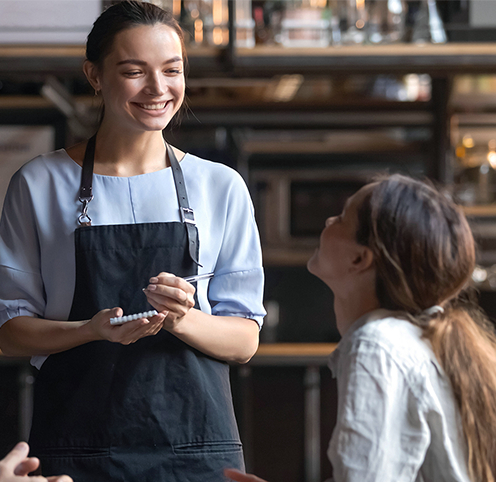Successfully operating a private restaurant. Where should one begin?
The restaurant business is attractive and exciting, but also risky. Opening a new restaurant, café or other catering business is a popular option and it can be quite simple. However, it will take vision, adequate capital, courage and optimism. Also, it requires full dedication and a lot of patience. But is that enough?
The catering sector is one of the most complex and competitive business sectors. It involves a lot of risk. A businessman opening a restaurant or café will need not only a good sense of adventure, but also specific knowledge. Where should one begin? What determines the success of a start-up? What areas require the most attention when getting started?
“Probably the most important criteria for a successful restaurant or other catering establishment are a responsibly-made menu, a convenient and ergonomic kitchen and a special focus on the staff,” said Gabrielė Ruginytė, restaurant kitchen designer and the founder of UAB Patogus Verslas.
“Thoroughly working out the menu is a must before opening the restaurant,” she noted. It is recommended to consider what kind of customer the menu is targeting, the location of the caterer and at what time of day the visitor traffic is expected. The menu should be tailored to the needs of the targeted customer groups and their eating habits. Will you be offering daily lunch to the staff of a business centre staff, meals for families with children, or maybe you intend to pay special attention to tourists visiting the city? “When designing every successful meal, it takes patient testing, choosing the best raw materials, selecting the most appropriate production technology and finding an aesthetic presentation,” the technologist said.

Newcomers to the restaurant business often focus on the interior details of the space. “The interior is also very important, but paying it too much attention often leads to overlooking one of the essential elements of the restaurant – a convenient and ergonomic kitchen. A practically designed kitchen determines both the quality of the meals and safety. I am probably right in saying that a customer will care very little about the colour of the walls when he is delivered a cold meal due to a lengthy food preparation process,” the technologist noted.
The expected technological production processes, volumes and service flows must be taken into account when choosing the right catering equipment. It is also important to keep in mind that the equipment will require proper operational maintenance to prevent a premature failure. According to our specialist, it is necessary to purposefully select high-quality and professional equipment while considering its maximum work load. “For example, investing in a high-performance, high-quality convection oven is crucial, especially when it will play one of the key roles in implementing your restaurant menu,” she claimed.
The representatives of UAB Audores, a company specialising in professional kitchen equipment, recommend choosing new, modern and high-quality cooking equipment. If your capital is limited, you should at least choose some good basic equipment. It should be noted that even used equipment must be sufficiently powerful and made of stainless steel. The best case scenario would be buying all your cooking equipment from one company, instead of from a few different ones. This will help you avoid misunderstandings and solve future problems. Companies selling professional kitchen equipment usually offer not only kitchen equipment but also a complete solution, which includes drawing up a technological plan, as well as aiding in the equipment selection, installation and delivery to employees.

A poor choice of premises and self-taught designs are also among the common mistakes made by newcomers to the restaurant business. A failure to provide all the necessary premises and working areas, inefficient allocation of space and ill-equipped kitchens lead to the risk of creating unfavourable working conditions for staff, as well as facing problems in coordinating permits with the public authorities. “It is especially important to pay attention to the quality of ventilation of the premises. When an inefficient ventilation system is installed in the restaurant’s kitchen, it causes discomfort for both the employees and customers. Each ventilation system must be designed individually, taking into account the production process, the size of the premises, the thermal equipment, the number of employees and other important aspects. It is recommended that installation options and prices of the ventilation system be evaluated during the selection of the restaurant premises,” Ms Ruginytė noted.
However, even a practical kitchen with the most professional equipment does not guarantee the success of a restaurant. Periodically-trained restaurant staff and the head of the kitchen – the chef, who is also known as the team leader – play a very important role. According to the technologist, restaurants often choose not to invest in such a specialist, even though the chef should play a key role in the restaurant.
When opening a restaurant or café, you will also encounter a number of technical and legal issues, such as caterers’ compliance with the requirements of the Territorial Veterinary Service, licences for the sale of alcoholic beverages (and tobacco products), permission for a cityscape-compliant signboard, consent of the neighbouring residents, fire system plans/schemes, cash register and cash books, and many more. It is also worth mentioning that if you open a restaurant in a facility previously used for catering services or in a mall, you will avoid some of the hassles in relation to the legal permissions, ventilation and fire protection systems.
Specialists recommend that start-up restaurants should not invest in real estate. It is instead better to rent the premises. The catering market is highly competitive and a large investment only increases the risk of not succeeding. Furthermore, if your business is subject to seasonal or other fluctuations in the catering industry, it is best to finance it with your own funds. Borrowing is not advised, as financial security is required.
Of course, there are no universal recipes for success that will suit every restaurant or café. Every case, as well as every success story, is unique. Good luck in creating yours!
